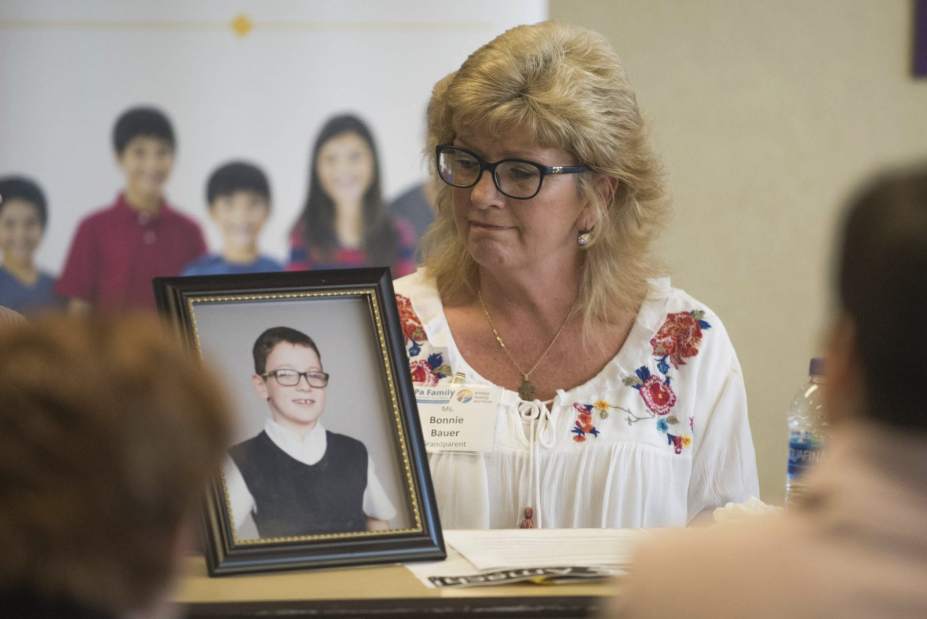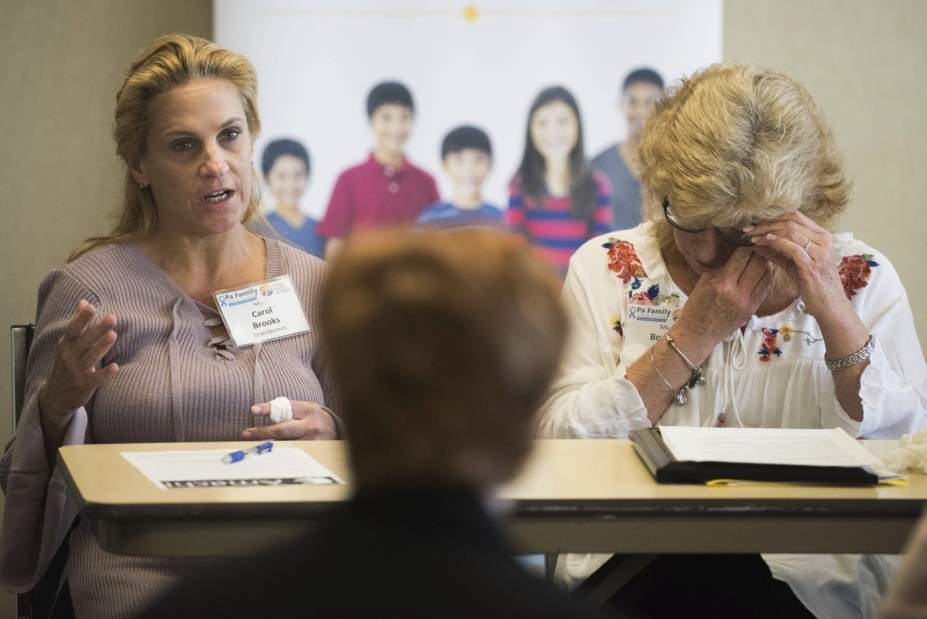Grandparents tell state officials they need help raising kids left parentless by opioids
Three grandmothers and a great-aunt shared stories Tuesday of their struggles with the opioid epidemic ravaging Western Pennsylvania and the country.
Each was unique, yet universal in its heartbreak. They were stories of drugs, death and the children left in their care.
Bonnie Bauer-Arnold, 54, of New Kensington has been raising her 9-year-old grandson since 2016 when her son — the child’s father — died of an overdose. Her son’s addiction, she said, lasted 16 years. He’d gotten clean. Then, he overdosed.
“Our little guy found him,” she said of her grandson. “His daddy was his world. He’s received PTSD therapy. We’ve done everything we can.”
That same year, the boy’s mother was murdered. Bauer-Arnold and her husband wiped out their savings and part of their retirement fund to wage a $14,000 legal battle for guardianship.
Speaking to a panel of state officials, the women detailed the struggles they face as grand- and great-relatives left to raise the kids of parents who succumbed to or remain entangled in substance abuse disorder.
Those listening wanted to take the ideas and problems back to Harrisburg to make lives easier for an older generation moving back into parenthood. They were Department of Health Secretary Rachel Levine, Department of Aging Secretary Teresa Osborne, Department of Human Services Secretary Teresa Miller and Department of Drug and Alcohol Programs Secretary Jennifer Smith.
Renee Crosby-Skinner, 52, was a single parent and got a call one morning to pick up her grandchildren, a 1-year-old and a 4-week-old. Crosby-Skinner dropped out of a doctoral program to care for the two infants as well as her high school-age son. It reversed her world, she said.
The panel was the third in a series of discussions held across the state as part of the Grandparents Raising Grandchildren Listening Tour.
“Our goal is to listen and capture where issues or gaps exist in the spaces where grandparents are attempting to navigate the health, human services, education and legal systems as they find themselves parenting for the second time around,” Osborne said.
Hosted in conjunction with the Pennsylvania Family Support Alliance, the intent is to gain a better understanding of the unique challenges of this growing population.
“With little notice, grandparents every day are thrust into the critical role of main caregiver, and they simply need more assistance,” PFSA President Angela Liddle said.
Roberta Casagrande, 72, of Manor has raised her great-nephew and great-niece since their birth. Her nephew, Giovanni, was 2 and her niece, Maddy, was 9 months when their mother died of an overdose in 2005.
A handwritten note from the children’s father, written and notarized 12 years ago, serves as the legal document giving her temporary custody of the children. The note, however, specifies temporary custody, which means that Casagrande does not have all of the rights that come with full custody. She discovered this when she tried to get passports for the children. She fears that without full custody, the children could be taken from her.
The women detailed the issues they’ve faced in taking over the care of the children of the opioid epidemic.
Nearly all of them mentioned child care issues, including Bauer-Arnold, who said she and her husband make too much money to qualify for a childcare stipend through social services but not enough to cover the cost of child care on their own.
Crosby-Skinner received a child care stipend, but finding a day care that fit the requirements for the stipend and remained within the stipend’s budget was difficult and frustrating, she said. The money was often late, she said, leaving her with the fear that her grandchildren would be left without day care, which would leave her unable to work.
Carol Brooks, 51, of Pittsburgh’s Brookline neighborhood is the only mother her 2-year-old grandson has ever known, she said. She has notarized temporary guardianship papers that, because they are not signed by a judge, are not universally recognized as legal.
“We need your help to keep our grandchildren alive,” Brooks said, speaking directly to the state officials sitting in front of her.
She told them that she, as she sat there, was in contempt of court because she has not given the toddler over to his mother because she fears the woman is not yet clean. She expressed her fears regarding the reunification process. She said she’s seen a lack of drug testing done before visits, and she thinks the process is rushed, to the detriment of the child’s safety.
“Trying to keep him alive is what I’m trying to do,” she said.
Megan Guza is a Tribune-Review staff writer. You can contact Megan at 412-380-8519, mguza@tribweb.com or via Twitter @meganguzaTrib.


